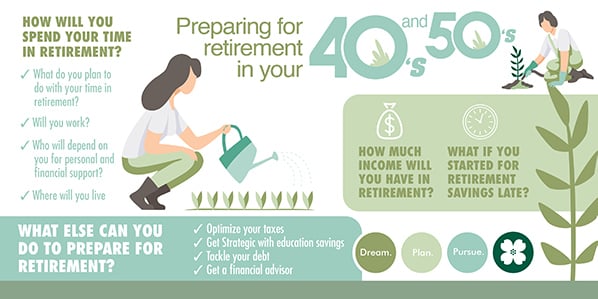
Investing and preparing for retirement is different at each stage in your life. What should you know about investing while in your 40’s and 50’s?
Investing and preparing for retirement is different at each stage in your life. What should you know about investing while in your 40’s?
While in your 40’s and 50’s, retirement is getting closer. That can be both an exciting and nerve-racking time for a lot of people. This phase of life requires serious thought about how you want to live in retirement, and making sure your finances are in line with your plans. Here are a few questions to ask yourself about your future retirement.
How will you spend your time while in retirement?
The ways you decide to enjoy retirement will have an impact on your finances. One of the most exciting parts of retirement is finally having the time to do what you’ve always wanted. You’ve likely considered what you want to do in retirement, but now is the time to make solid decisions and build your plans.
-
What do you plan to do with your time in retirement?
What will an average day look like for you? Are you thinking about volunteering, traveling, honing your craft, or just enjoying time on the porch? You’ll need to be sure you have the means to support your desired lifestyle, while factoring in inflation, basic living costs, and health care costs. -
Are you planning on working?
Even though your working career is behind you, picking up a part-time job can be a great way to meet other people. Working can provide a sense of purpose, give you a schedule to stick to, and earn some money on the side. -
Will anyone depend on you for personal and financial support?
Maybe you have a spouse, adult children, or grandchildren who depend on your finances. Or, are you currently caring for an aging parent, or could you in the future? These types of situations will affect your financial plan. Evaluate costs of financial support in terms of time and dollars, and be sure to include that in your retirement plan. -
Where do you want to live?
Your residence affects your income, as well as your emotional, social, and physical health. Are you wanting to move closer to family, or downsize your home? Research any income taxes if you’re planning on moving. Also, consider your location and dwelling needs as you get older – would a single-level home meet your needs better?
How much income will you have in retirement?
You might know how much money you saved for retirement, but what monthly income will your retirement savings provide? Consider the number of years you need your savings to last, the expected rate of return, and withdrawal tax rates. Use our Retirement Income Estimator to calculate your monthly income during retirement.
It’s a good time to do a thorough review of your portfolio, and make sure your investments are on-track. What is your Social Security estimated income? Social Security should provide less than half of your future income, meaning your retirement and/or pension, and savings, should cover the rest. If you have a 401(k) or IRA, are those accounts still yielding the results you need? Also, it’s important to remember the impact of inflation on your retirement plan. As one of the basics of investing, inflation is how life gets more expensive over time.
What if you started saving late for retirement?
Whether you don’t have as much saved, or your accounts aren’t performing how you want, you still have some time. Try to invest the maximum in your 401(k), and consider these options:
- Evaluate if a Roth IRA or Traditional IRA will help supplement your income.
- Look at your debt and see how much you could pay off before retirement.
- Take a close look at your portfolio, and consider diversifying your assets.
- Don’t take on additional or unnecessary risk to try making up for lost time. Instead, consider what adjustments you could make to help maximize your return.
- Meet with your financial advisor to be sure you’re making the most of this time to get back on-track.

What else can you do you prepare for retirement?
There are plenty of people who invest later in life, and still reach their retirement goals. The key is making smart financial decisions right now. Here are a few financial strategies to implement in your 40’s and 50’s.
-
Optimize your taxes.
After you claim all available deductions, it’s time to optimize your investment contributions. Be sure you’re optimizing the power of compounding interest any time possible, especially if you can earn compound returns while enjoying a tax benefit. Depending on your IRA and tax bracket, your IRA can provide tax-deferred growth, and may be tax deductible depending on your (or your spouses) workplace retirement plan. Beyond IRA tax optimization, consider if a Health Savings Account (HSA) is right for you. HSAs can pay for eligible medical expenses, and allow annual contributions. These contributions grow tax-deferred until you need funds. -
Get strategic with education savings.
Outside of retirement, a major goal for investors with children is paying for education. There are many different options for saving for education, and a popular account is a 529 savings plan. Contributions to a 529 plan grow tax-free, and withdrawals are tax-free when used for qualified education purposes. Many states offer a state income tax deduction on contributions to a state-sponsored plan. It’s important to remember not to jeopardize your retirement fund for a child’s educational costs. Student loans exist to help pay for school, whereas this is not the case with your retirement fund. -
Tackle your debt.
When prioritizing your debt, start with the highest interest rate debt first. According to Forbes, Generation X (currently those ages 40-55) carries the most consumer debt of any generation. Roughly $8,000 in credit card debt, $240,000 in mortgage debt, $20,000 in auto loans, and $40,000 in student loan debt. While some of these amounts can vary per person and situation, getting a handle on debts can allow you to build up your savings. A good place to start with minimizing debt is to set up a budget. You might already have a financial plan, but it won’t hurt to evaluate to make sure your plan is helping you meet your goals. -
Get a financial advisor.
The first step toward reaching your goals is finding the right advisor to help get you there. A financial advisor helps to guide you through the steps of creating a personal financial plan . They will help prioritize goals, analyze investments, and allocations. As well as present recommendations for consideration, and help monitor to make sure you’re on track to achieve your goals. With the help of a financial professional, you can be sure you’re making the best money decisions to set yourself up for success.
As you get closer to retirement, it’s important to make sure your investments and accounts are optimized for the most success. By ensuring you’re on course now, will provide peace of mind in retirement and allow you to enjoy your hard-earned relaxation. As always, we’re here to help you. If there’s anything we can assist you with, please contact us.
Sources:
Preparing for retirement in your 40s and 50s: questions to ask yourself
This material is intended for informational purposes only, and should only be relied upon when coordinated with specific individualized professional advice, as individual situations will vary.
Contributions to a traditional IRA may be tax deductible in the contribution year, with current income tax due at withdrawal. Withdrawals prior to age 59 ½ may result in a 10% IRS penalty tax in addition to current income tax.
A Roth IRA offers tax deferral on any earnings in the account. Qualified withdrawals of earnings from the account are tax-free. Withdrawals of earnings prior to age 59 ½ or prior to the account being opened for 5 years, whichever is later, may result in a 10% IRS penalty tax. Limitations and restrictions may apply.
Prior to investing in a 529 Plan investors should consider whether the investor’s or designated beneficiary’s home state offers any state tax or other state benefits such as financial aid, scholarship funds, and protection from creditors that are only available for investments in such state’s qualified tuition program. Withdrawals used for qualified expenses are federally tax-free. Tax treatment at the state level may vary. Please consult with your tax advisor before investing.
The information provided in these articles is intended for informational purposes only. It is not to be construed as the opinion of Central Bancompany, Inc., and/or its subsidiaries and does not imply endorsement or support of any of the mentioned information, products, services, or providers. All information presented is without any representation, guaranty, or warranty regarding the accuracy, relevance, or completeness of the information.
Category: Investing
